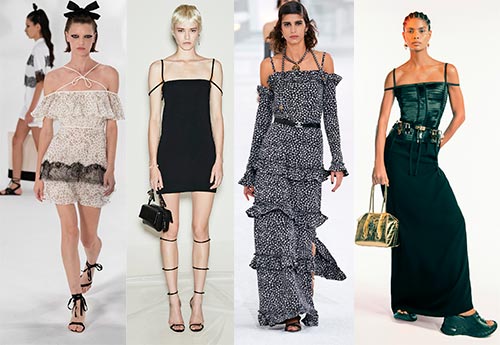Interview
Emigration from Russia and family life in Italy
Most Russians have never been abroad, and if they have been, it has been exclusively on tourist trips. Tourists often see the best side of life, due to which there is an opinion that it is good everywhere, but not in Russia.
Therefore, many girls dream of going to Europe by all means in order to arrange life in the best possible way. mystylex.techinfus.com/en/ wants to share his impressions of life in Italy, and reveal the main pros and cons.
Italy gave birth to the concept known throughout the world as dolce vita. The main touches of this lifestyle are sought by tourists who are attracted by the rich cultural heritage, the mild subtropical climate, wonderful beaches, and foreigners who come here in search of a better destiny are trying to take over.
It seems that against the backdrop of world famous architectural landmarks, surrounded by vivid landscapes, in Italy life is somehow special - rich, dynamic, stormy - in a word, like in a movie. It is natural that dolce vita is a purely Italian concept.
This theme is also heard in a detailed story about life in sunny Italy, a native of Belgorod, and currently a resident of the small resort town of Pineto (Abruzzo region, Teramo province) on the Adriatic coast and the wife of a native Italian. Now Olga is a housewife. At my request, she spoke about how the life of an Italian family looks from the inside.


About home bookkeeping
The most significant item of expenditure in the family budget is utility bills. By the way, utility bills are paid mainly once every two months, for water supply and drainage - once every three months.
Almost half of my husband's salary is consumed by the payment for the "communal apartment", the purchase of gasoline for two cars (each of us has his own) and medicines (they are quite expensive).
What a pretty penny does a communal apartment cost? Our family uses gas on average 1000 euros per year. We pay for water about two hundred euros annually, for a landline telephone with the Internet - 390 euros. Payment for electricity costs about 540 euros per year, garbage disposal - 250 euros. Is it a lot or a little? Judge for yourself: our family's income is 2,200 euros per month.
With regard to electricity, gas supply, telephone with the Internet, in Italy the subscribers themselves choose the company that provides these services; competition reigns in the respective markets.
Different tariff offers. For example, a month ago we used the services of an organization offering consumers a cheaper tariff for electricity in the evening and at night and a more expensive one during the day. Then they decided to change the energy supply company, since such a tariff encouraged the fact that most of the housework was postponed overnight.
At some point, I decided that it was burdensome and enough for me. Therefore, my husband and I chose a tariff from another organization. Now we pay the same for electricity consumption both day and night.

In Italy, food is quite expensive. But there is a wide assortment, and you can choose food for every taste. A big plus is also that all products are of high quality and buyers do not even have a doubt.
There is very strict control over the observance of sanitary standards. There is no chance of bumping into expired groceries in the supermarket or food that has been stored or handled improperly.
Most of Pineto's residents shop in supermarkets, as well as in specialized small shops. Let's say meat and cheese, I often buy in the same store. There is no market that would be open all days in Pineto.
Our market is open only on Saturday. In neighboring cities - on other days of the week.The markets usually sell vegetables and fruits. There are also clothing markets where you can buy clothes and shoes.
About family ties
It’s probably not news to you that Italy has very strong family ties, especially when compared with other European countries or the United States. Italians communicate closely with members of their family "clan". In Italy, there are numerous relatives, close and not so much - aunts, uncles, cousins and cousins, who are going to celebrations - weddings, anniversaries.
All family members meet at Christmas. It is also customary to invite someone from relatives to dinner on Sunday or on holidays. But lunch is exactly lunch, not the "gulka" that is arranged in Russia.
At a dinner party, the Italian hostess serves two or three homemade hot dishes, coffee with dessert, and fruit. But the family in Italy is not only to arrange gatherings at the set table.
If someone gets to the hospital, relatives visit him, are on duty near the patient, although the patient is constantly looked after by an attentive medical staff, and the hospital provides good nutrition, and there is no need to carry food from home.
The family will also come to the rescue in the event that one of the relatives gets into trouble. These can be financial difficulties, judicial red tape. Usually, in difficult life situations, Italians, first of all, count on the support of their "clan", not friends.

About parenting
In Italian families, children are pampered. The whims of the child are usually satisfied. For example, in some families, parents allow teenagers from the age of fifteen to go to a disco. At discos, all sorts of temptations, to put it mildly, useless for young people, to which they, due to lack of sufficient life experience, can succumb.
The school curriculum in Italy is difficult. Without the help of one of the parents or grandparents, not every student can cope with their homework.
Therefore, when a child begins to go to school (from the age of six), many working mothers have a choice: continue to work and hire a governess for the child, or quit and devote maximum time to studying and raising their child.
There is no such thing as "extended" in Italy. In the first grade, children, one might say, get used to school. The homework of the first grader consists in coloring special notebooks.

Primary school is five grades. Incomplete secondary education - plus three more classes, and then another five years of study at the Lyceum. And only after the lyceum - higher education.
Students study at universities for three to five years, after which specialization lasts for another two years. Lyceums are different. Scientific and classical lyceums provide the highest quality education. They are chosen by boys and girls who plan to get higher education. You can choose a professional lyceum. This is an analogue of Russian technical and vocational schools.
Preschool children usually go to kindergarten. It can be either a public kindergarten or a private one. Children in the kindergarten do not sleep, which is inconvenient. At 4 pm, the pupils are no longer in the kindergartens. If the baby does not have lunch, then he can be in the garden only until twelve o'clock.
We sent our son to the garden at the age of three. There is no public kindergarten near us, so for the first two months, so that the baby gets used to the team, I took him to a private one. He was there for two hours, five times a week. For this we paid 80 euros per month. Also, the child's classes in sports clubs are exclusively paid. For example, attending swimming training sessions costs 40 euros per month.
About rest
Italians don't sit at home watching TV on weekends. Spouses, alone or with children, go to cinemas, cafes, pizzerias. Regarding restaurants, prices are quite high there, but Italians do not refuse such a pleasure: if the family budget allows, then why not have lunch or dinner at a restaurant once a week.
But such, as shown in television series, when the hostess did not want to mess with dinner - the family went to the restaurant every day - of course, not.
The resort Pineto has clean, comfortable sandy beaches, where you can rent equipment for water sports, everything for beach volleyball, all kinds of water entertainment ... Tourists come to Pineto to relax on the Adriatic coast (the water here is crystal clear). Most of all Germans and residents of the northern part of Europe.
The townspeople also do not neglect the opportunity to soak up the beaches. There are plenty of restaurants, pizzerias, bars, souvenir shops in the city. All this for every taste and wallet.
In Italy, there are specially designated places for those who like outdoor recreation. Usually on picnics they cook barbecues, not kebabs. It would never even occur to an Italian to have a picnic somewhere in the woods, in an unauthorized place. The penalty for this will be very substantial. Mushroom pickers are also not allowed to go on a "quiet hunt" without a special license to pick mushrooms.
Those who like to relax in a crowded place accompanied by loud music will have to leave the city - discos are located at a decent distance from cities. All discos from Pineto are twenty kilometers away. They open at twelve at night and work until the morning. Thus, the government protects the peace of the townspeople from loud music and bright lighting of entertainment establishments.


About Italian cuisine
Quite often I heard the phrase: “Well, what do you cook in Italy? Some pasta. " This is a misconception. Of course, Italian cuisine is famous for its pastries. This is pasta, and lasagna, and ravioli, and tortellini (Italian dumplings with cheese, meat or vegetables), and of course, pizza.
All of these dishes are present in a wide variety of varieties. They are tasty, quite affordable, safe, so Italian housewives can always choose to cook a dish themselves or use a semi-finished product.
It must be explained that semi-finished products are of varying degrees of readiness: some are enough to heat up in the microwave, while others only serve as part of the dish that women cook at home. It's very convenient, but most of my friends still cook themselves.
In general, homemade food is highly valued in Italy. If I treated someone to my dish, it is "wow!" Store-bought ones, even tasty ones, do not deserve such respect.
Everything you need is here to improve your culinary skills. All food products are of high quality, always fresh. You can buy any of the highest grade delicacies. It's no secret that Italians love tasty and satisfying food, so food is a pleasure.

About the feeling of beauty
I will not reveal a secret if I say that the overwhelming majority of Italians are aesthetes. Everything should be beautiful for them. Starting from the house and yard and ending with the general view of the cities. And the authorities are worried that no one spoils the picture of the city landscape.
For example, in Italy you will not see a single multi-storey building in which some balconies are glazed and others are not. Either all are glazed, or none. And the fact is that apartment owners decide this at meetings by a majority vote: whether the balconies will be glazed. If the majority has made a decision, then there is nothing left to disagree how to submit to the will of the majority. Otherwise, a fine. And rather big.
It's clean in the cities. Household waste is removed depending on the season. Pineto, as I noted above, is a resort town, therefore, when the number of people in the city almost doubles in summer, garbage is taken out more often. By the way, in Italy separate waste collection: organic waste is removed separately, paper and plastic separately. Separation of waste is carried out by each person himself.
Love for comfort and neatness is also manifested in the fact that Italians keep poultry and livestock exclusively in country houses. In cities, this is officially prohibited. Such a strict requirement, however, does not apply to pets: dogs, cats.
There are four-legged "residents" in almost every house. Moreover, the Italians for the most part choose not purebred pets.You can often see mongrel dogs walking on the reins on the street.

About the cult of youth and grooming
Italians are very concerned about their appearance. This also applies to ability to choose clothes depending on the place of the event and the time of day. Simply put, during the day you will not see people dressed in evening dress on the street, and no one would ever think of going to a solemn event dressed in casual style.
Usually, Italians are dressed in outfits of Italian brands made from natural fabrics. A daytime win-win for women is navy blue jeans and a white shirt. If the Italians somewhere before dinner meet a woman with bright evening make-up in an elegant dress, and even in high-heeled shoes, they will decide that the señora did not spend the night at home and returns from a party.
There are many beaches in Pineto, and there are many vacationers on them, but in the evening on the embankment, in city cafes and pizzerias, you will not see people in beach slippers, shorts and T-shirts, in which they were on the beach during the daytime.
If the girls are in shorts and slippers, then these are shorts "on the way out" - of the appropriate cut and made of expensive fabric, and slippers - leather, can be decorated with rhinestones. By the way, for Italians a miniskirt and shorts over the age of 40 are taboo. Even if the figure allows.
I have heard that in Italy seniors are very fond of fur coats. And they brag about them even in relatively warm weather. Have not noticed. At least in Pineto, in expensive fur coats, I saw older women at Christmas. And here leather outfits popular.

About jewelry, then here they are sorted out. White gold with diamonds, emeralds, rubies, sapphires, pearls, in a word - expensive jewelry stones is fashionable. They give preference to elegant, not massive products. It is also important that jewel was from a well-known brand.
Every Italian woman makes sure that the “jeweler” does not go overboard. Here women know - you can overdo it and become like a Christmas tree. In Italy, this is not a show of wealth, but bad taste. To complete the picture, it must be said that Italians, and not only women, but also men, also take good care of themselves.
For women, visiting beauty salons is a daily routine. They do all kinds of cosmetic procedures: peeling, masks, anti-aging procedures, waxing. I'm not even talking about manicure-pedicure. A manicure with nail polish starts at ten euros, "French" - about 20, and painting on nails is much more expensive.
Men use face creams. Nobody considers it "not a man's business." In general, looking younger than your age and taking care of your health is a worthy goal for all middle-aged Italians.
At the end of the conversation, I asked my friend what, in her opinion, the famous dolce vita is. Olga, thinking, answered in a philosophical way: this is the understanding that life is fast flowing and you need to enjoy the pleasures that it gives, here and now.
And she added, smiling: “In my opinion, for Italians, dolce vita is more of a kind of travel brand that attracts travel lovers. And what's wrong with that? Italy deserves this attention. "

Tell friends:
Comments and Reviews
Add a comment
Rating news
Shades of clothing that make women look younger
What shades of hair make women younger: rules and photos
Funny wedding dresses - photos and ideas
12 most expensive down jackets for the winter
How to look 25 at 40: tips from supermodels
Beautiful schoolgirls
Anti-aging haircuts and hairstyles for women
Fashionable skirts for autumn and winter
Fashionable women's trousers for the cold season
Fashionable and stylish sandals for summer 2020
Spring-summer 2021
 Fashionable dresses and tops with thin spaghetti straps
Fashionable dresses and tops with thin spaghetti straps
 Bandana tops: how to wear stylishly and beautifully
Bandana tops: how to wear stylishly and beautifully
 How to put together the perfect men's wardrobe for the summer
How to put together the perfect men's wardrobe for the summer
 Trendy shorts for spring-summer 2021
Trendy shorts for spring-summer 2021
 Fashionable skirts for spring-summer 2021: a guide to online shopping
Fashionable skirts for spring-summer 2021: a guide to online shopping
 The most fashionable dresses spring-summer 2021: styles and colors
The most fashionable dresses spring-summer 2021: styles and colors
 Fashionable total look 2021: image ideas and trends
Fashionable total look 2021: image ideas and trends





